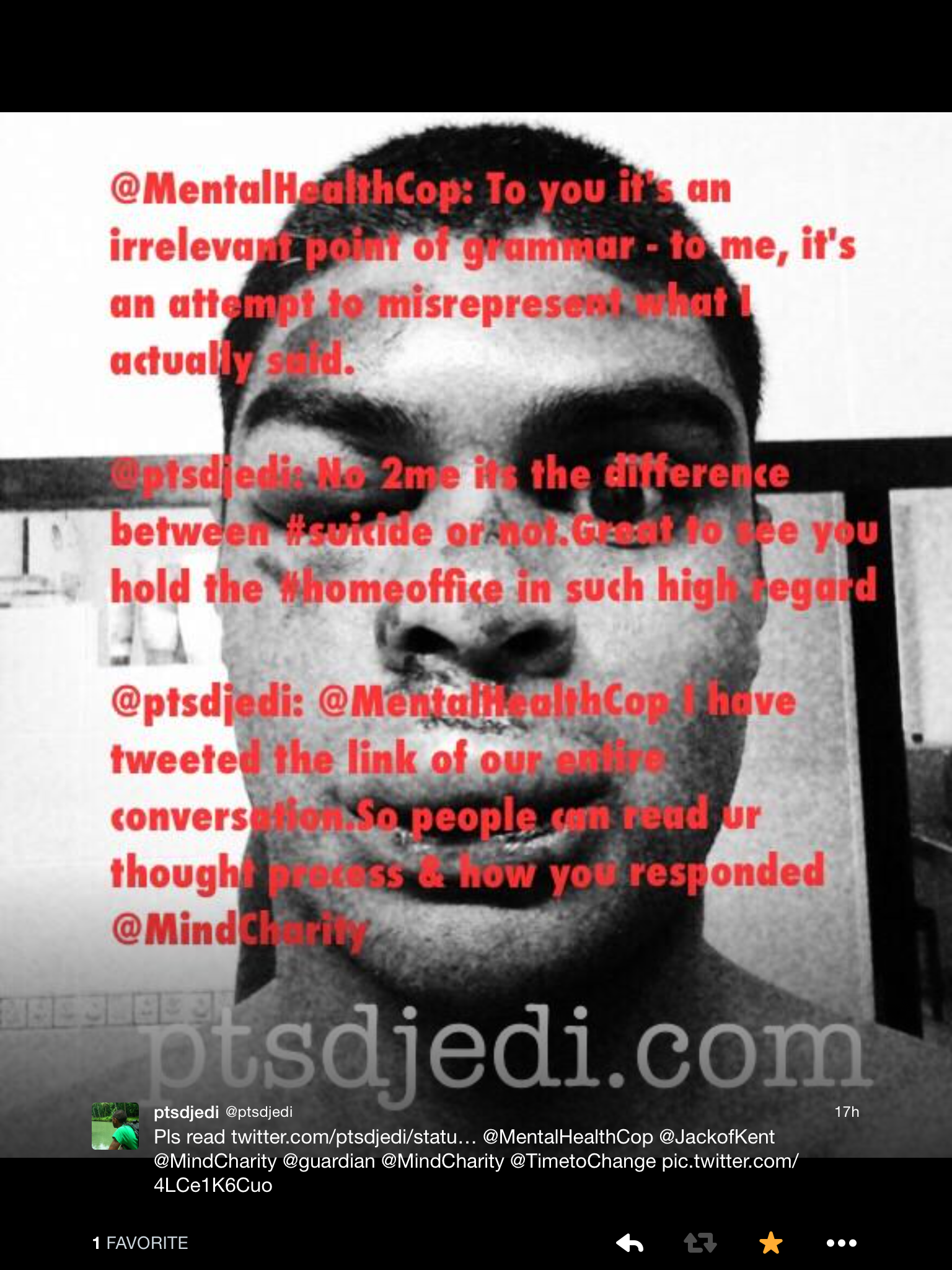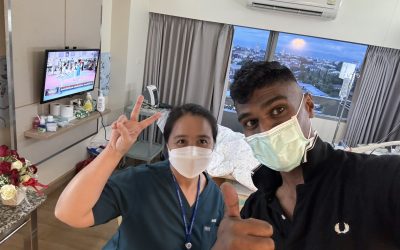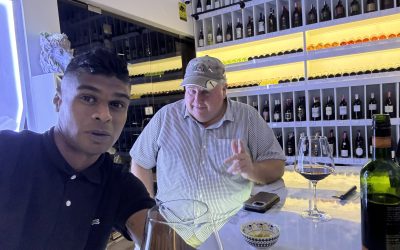By ptjdjedi | February 14, 2015 | Updated October 2024
Introduction
Looking back at this post from 2015, I’m reminded of how the smallest interactions—like a heated Twitter exchange—can reignite trauma in unexpected ways. The struggle for mental health advocacy has been ongoing, but the desire to bring awareness to the flaws in the system is still as strong today as it was then. I’m sharing this again to reflect on that journey and remind myself—and others—that the fight is worth it.
A Twitter Trigger: Confronting @MentalHealthCop
For the second time in the past 5–6 months of using Twitter, I found myself in tears. I’m not sure if it’s a sign of weakness or strength admitting this, but to be honest, I don’t really care either way. It’s the truth.
The first time was during a Twitter conversation (or argument, really) with Inspector Michael Brown, known as @MentalHealthCop—National Mental Health Coordinator at West Midlands Police. I’m not sure if it was his sheer arrogance, selective memory, or lack of empathy, but some of his remarks were genuinely horrific, especially considering his role in mental health policing.
The discussion hit hard, bringing back traumatic memories of what happened to me at Fulham Police Station—a 14-hour ordeal without appropriate medical care that left me suicidal and physically injured. Days after that Twitter exchange, I found myself in the hospital, needing steroid injections for my back, a direct consequence of the flashbacks triggered by the conversation.
I was in disbelief that an online interaction could have such a powerful impact on me physically, but when I explained everything to my specialists, they confirmed that the intensity of trauma flashbacks can indeed retrigger physical symptoms—just as it had done in my case.
Facing Trauma in Fulham: A Recap
For those unfamiliar, my time at Fulham Police Station was a pivotal moment in my PTSD journey. After being held in custody for 14 hours without appropriate medical care, I was left suicidal. The trauma from that experience still haunts me. To have a Twitter conversation with someone who should understand mental health issues—like @MentalHealthCop—trigger those memories was unexpected but devastatingly real.
It wasn’t just an emotional reaction. The trauma was so intense that it exacerbated my existing physical injury. But beyond the pain, it was the reminder that the very people who are supposed to protect and support the mentally vulnerable can fail so spectacularly. That’s why this fight is so personal to me.
Why I Can’t Stay Silent
Despite warnings from my specialists not to engage with @MentalHealthCop again, I can’t morally or ethically ignore it. His role in UK mental health policing and his active presence on social media mean that people trust him to be an authority on the subject—just as I did, until I realized his lack of empathy and understanding.
This isn’t the post where I’ll deconstruct his rhetoric or the mental health policing procedures that compartmentalize the responsibility of care. That’s a conversation for another day. Right now, my focus is on my own well-being. I’m about to head to Koh Phi Phi—the island where I was caught in the tsunami—and I need to protect myself before I try to help others.
Returning to Thailand: Confronting Past Trauma
I’ve made a promise to myself: before I fight for change, I need to look after my own well-being. This isn’t just about surviving; it’s about having the strength to ensure that others don’t go through the same pain I did. If I can save just one life, it will be worth whatever personal cost I endure.
A few days ago, I returned to Bangkok, and it brought back a flood of memories. While I was caught in the tsunami on Koh Phi Phi, the psychological trauma hit hardest when I was trying to get my friend Kathryn airlifted to Bangkok from Krabi. Visiting her daily in intensive care was brutal—seeing her in such pain, feeling helpless, and remembering the conversations with doctors who weren’t sure she’d make it.
I’ll never forget sitting beside her bed, breaking down, and praying for her to pull through. At that moment, I was willing to bargain with any higher power just to see her survive. When she eventually came off life support, I left Thailand—but I was consumed with guilt. Why had I survived when thousands had died?
Why I Continue the Fight
This brings me to the series of Twitter messages I received a couple of days ago—heartfelt messages from four lovely individuals that caught me completely off guard. Their words reminded me that despite the pain, what I’m doing is worth it. It’s the reason I fight.
After recording an interview with Dr. Jennifer Wild in Pai last week—reflecting on the trauma I experienced and the treatment that saved my life—I realized how far I’ve come. Dr. Wild’s intervention at Oxford University’s CADAT/NHS Maudsley was a turning point for me. Without her, I wouldn’t be here today.
But that conversation wasn’t just about my progress. It brought back memories I’d been trying to avoid, much like my return to Bangkok. Facing Kathryn’s pain, the trauma of the tsunami, and my own survivor’s guilt—it was all too much. But as hard as it is, I know I have to face these moments head-on to truly heal.
A Renewed Sense of Purpose
Those Twitter messages gave me something I didn’t expect: strength. Despite all the pain I’ve been through, it empowered me. It reminded me that what I’m doing—fighting for mental health awareness, highlighting the flaws in the system, and pushing for change—is worth every tear, every moment of doubt, and every ounce of energy.
As Mos Def and Talib Kweli once said:
“I don’t get many compliments, but I am confident.
I used to have a complex about getting too complex,
But you’ve got me willing to try.”
Those lyrics remind me that despite the complexity and challenges of this fight, I’m willing to see it through. Much love to everyone who’s shown support along the way. Your encouragement fuels my strength.
Final Thoughts and Call to Action
If there’s one thing this journey has taught me, it’s that we can’t remain silent in the face of broken systems. If you’ve experienced similar failings in mental health care, I encourage you to share your story, engage in conversations, and hold those in authority accountable. Together, we can push for real change.
To anyone who feels lost in the system—keep fighting. It’s worth it.





0 Comments